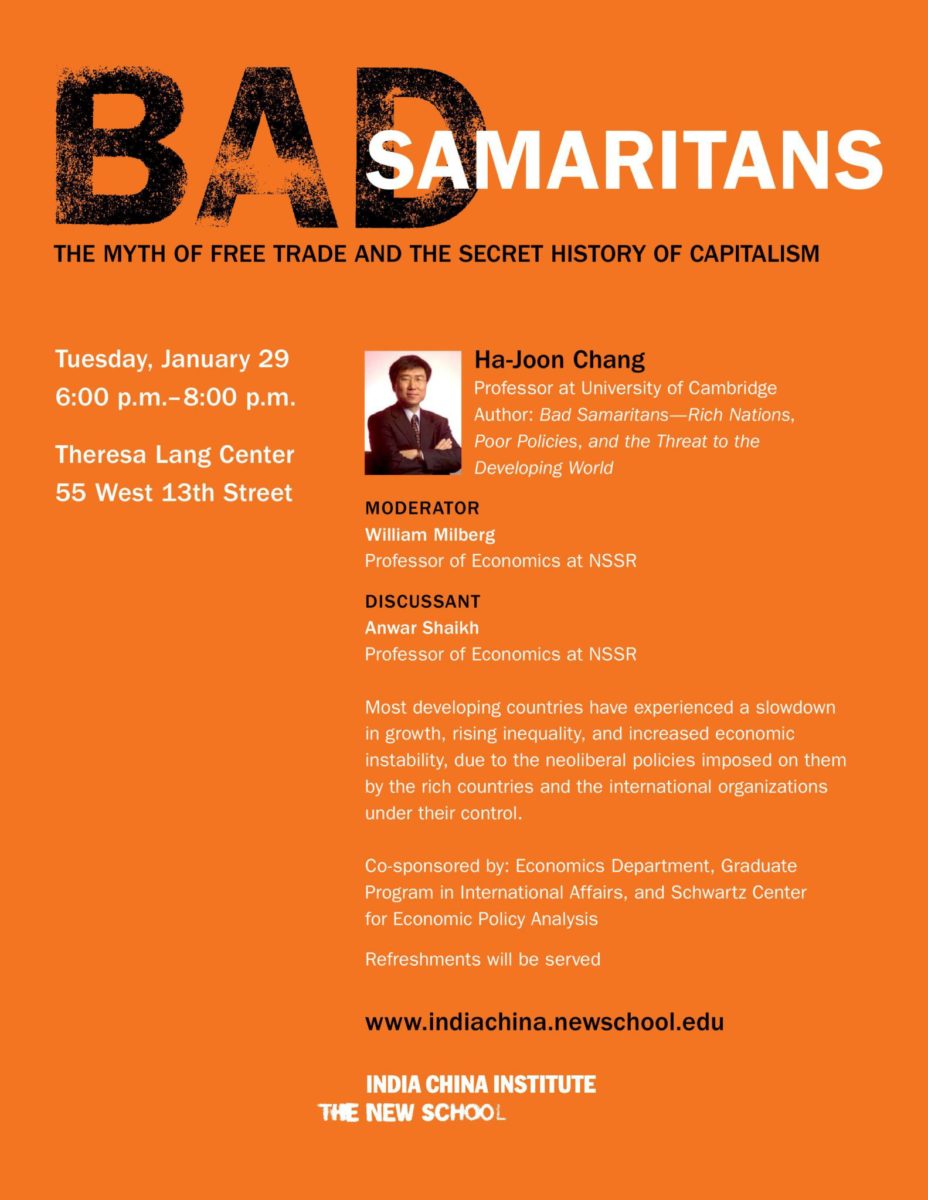
Bad Samaritans: The Myth of Free Trade and the Secret History of Capitalism
January 29, 2008 , 6:00 pm – 8:00 pm

Co-sponsored with Schwartz Center for Economic Policy and Analysis, Economics Department, and Graduate Program for International Affairs.
Over the last two and half decades, most developing countries have experienced slowdown in growth, rising inequality, and increased economic instability. The outcome is, Ha-Joon Chang contends, due to the policies imposed upon them by the rich countries and the international organisations that they control free trade, free international investment, privatisation, stronger protection of intellectual property rights, and conservative macroeconomic policies. Chang argues that there are good theoretical reasons that those policies produce such outcome. He backs this contention by showing that neo-liberal policies that the “Bad Samaritan” rich countries have been promoting are actually not the policies that they themselves used when they were developing countries themselves nor are they policies used by more recent development success stories, from 1960s Korea and Taiwan down to China and India since the 1980s. Featuring Alexander Hamilton, the Lexus, Nokia mobile phone, his son, Orson Welles, and an elephant (if he has time), Chang’s talk argues for a fundamental reform of the international economic system and for national policies focused on raising long-term productivity (mostly) in manufacturing.
Ha-Joon Chang, a Korean national, has taught at the Faculty of Economics, University of Cambridge, since 1990. In addition to numerous articles in journals and edited volumes, Ha-Joon Chang has published nine authored books (three of them co-authored) and eight edited books (six of them co-edited). His most recent books include Kicking Away the Ladder: Development Strategy in Historical Perspective (Anthem Press, 2002), Globalization, Economic Development and The Role of the State (Zed Press, 2003), and Reclaiming Development: An Alternative Economic Policy Manual (with Ilene Grabel; Zed Press, 2004), and Bad Samaritans: Rich Nations, Poor Policies, and the Threat to the Developing World(Random House, 2007). His writings have been translated into 15 languages. Apart from his academic activities, Ha-Joon Chang has worked as a consultant for numerous international organisations, including various UN agencies (UNCTAD, WIDER, UNDP, UNIDO, UNRISD, INTECH, FAO, and ILO), the World Bank, and the Asian Development Bank. He has also worked as a consultant for a number of governments (the UK, Canada, Japan, South Africa, and Venezuela). Ha-Joon Chang is the winner of the 2003 Myrdal Prize, awarded to his book, Kicking Away the Ladder, by the European Association for Evolutionary Political Economy (EAEPE). He is also the winner (jointly with Richard Nelson of Columbia University) of the 2005 Leontief Prize for Advancing the Frontiers of Economic Thought awarded by Tufts University.
William Milberg is Associate Professor of Economics at the New School for Social Research and Program Coordinator for the Schwartz Center for Economic and Policy Analysis. His research focuses on the implications of changes in international trade and investment flows for employment and income distribution. He has worked as a consultant to the UNDP, UNCTAD, and ILO. He is the co-author (with Robert Heilbroner) of The Crisis of Vision in Modern Economic Thought and The Making of Economic Society. He received his Ph.D. in economics from Rutgers University in 1987.
